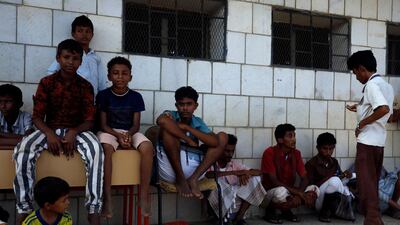Displaced people around the region are tipping into hunger and homelessness due to the coronavirus outbreak, the Norwegian Refugee Council said on Monday.
Nearly three quarters of the 1,400 people surveyed across countries including Iraq, Libya, Afghanistan and Mali said they had suffered a clear deterioration in their living conditions since the pandemic gathered pace earlier this year, the NRC said in a report titled Downward Spiral.
The NRC found that nearly 70 per cent of people “had to cut the number of meals for their household”, while 77 per cent had lost a job or income from work, and 73 per cent said they were less likely to send their children to school due to economic hardship.
“The world’s most vulnerable communities are in a dangerous downward spiral,” the NRC Secretary General Jan Egeland said.
“Already forced from their homes by violence, often with limited rights to work or access to government services, the economic impact of the pandemic is pushing them to catastrophe,” he said.
The report found that the general economic downturn due to the pandemic has caused populations affected by conflict and displacement to lose work and income.
Those affected have suffered a severe loss of funding, limited access to social safety nets, a drop in remittances and increased debt, the report said.
While donors and international financial institutions have responded to the crisis, the scaled-up support has not been nearly enough.
“As of September, the UN’s 2020 humanitarian appeals were only 25 per cent funded. In addition, funds have so far been slow to reach those in need and initial donor commitments have prioritised the health response over programmes to address the economic impact,” the report said.
The NRC sounded a warning that even a fully funded humanitarian response would not be able to meet the needs that are now arising.
“An urgent scale-up in aid is needed, but humanitarian assistance alone cannot fix this,” Mr Egeland said.
“The rich countries of the G20 and international financial institutions must put displaced and conflict-affected communities at the centre of national and international economic responses to Covid-19. Without urgent action, this crisis will spiral out of control.”
The NRC’s survey was conducted among 1,413 displaced and conflict-affected people in Afghanistan, Colombia, Iraq, Kenya, Libya, Mali, Uganda and Venezuela, with additional research in Somalia, DR Congo, Lebanon, Jordan, Burkina Faso and Yemen.
The UN voiced concern about the rise in world hunger even before the spread of the pandemic.
According to an annual report published in July, about one in nine people were chronically undernourished in 2019, and things were expected to deteriorate in 2020 due to Covid-19.


